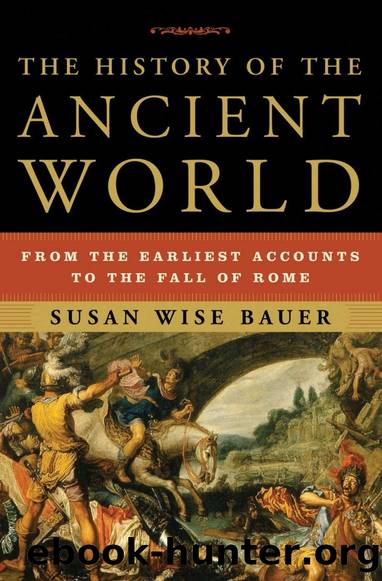The History of the Ancient World: From the Earliest Accounts to the Fall of Rome by Susan Wise Bauer

Author:Susan Wise Bauer [Bauer, Susan Wise]
Language: eng
Format: epub
ISBN: 9780393059748
Google: St9_mAEACAAJ
Amazon: B001PNYJ1C
Barnesnoble: B001PNYJ1C
Goodreads: 8259063
Publisher: W. W. Norton & Company
Published: 2007-03-17T00:00:00+00:00
Cyrus, a Persianâ¦acquired very many people, very many cities, and very many nations, all obedient to himselfâ¦. was willingly obeyed by some, even though they were distant from him by a journey of many days; by others, distant by a journey even of months; by others, who had never yet seen him; and by others, who knew quite well that they would never see him. Nevertheless, they were willing to submit to him, for so far did he excel other kings.18
For all Cyrusâs justice and benevolence of soul, he excelled other kings primarily in creating terror. âHe was able to extend fear of himself to so much of the world that he intimidated all,â Xenophon remarks, before going off into paeans of praise over Cyrusâs justice, âand no one attempted anything against him.â19 What he could not accomplish by fear, he bought; he was generous enough with his own wealth when the prospect of greater gain was in view. âHe went far beyond everyone in courting with food,â Xenophon says, much later, ââ¦he surpassed human beings still much more in giving the most giftsâ¦Who else, by the magnitude of his gifts, is said to make people prefer himself to their brothers, to their fathers, and to their children? Who else was able to take vengeance on enemies who were a journey of many months in distance as was the king of the Persians? Who else besides Cyrus, after overturning an empire, was called âfatherâ when he died?â20
This is a creepy use of the title âfather,â and becomes creepier when Xenophon goes on to point out that âFather Cyrusâ used his gifts to convince people all over his empire to become âthe so-called Eyes and Ears of the King,â and to report to him anything âthat would benefit the kingâ¦. There are many Ears of the king, and many Eyes; and people are everywhere afraid to say what is not advantageous to the king, just as if he were listening, and afraid to do what is not advantageous, just as if he were present.â21
Nevertheless Xenophon insists on seeing, in Cyrus, something new: a new kind of emperor. He is wrong in thinking that this ânewnessâ was the justice, benevolence, and fairness of the king. Cyrus, like every other great king before him, kept hold of his empire by force and by fear. But his empire was certainly ânewâ in the number of different peoples that it managed to unite together under one rule. Now the Medes, the Lydians (including Phrygia), and the northern provinces of Assyria (conquered by his grandfather) were all part of Persia. Cyrus gave to Harpagus the task of conquering the Ionian cities along the coast, and himself turned back to campaign to the east of the Median territory; inscriptions and mentions in ancient texts suggest that he fought his way almost all the way over to the Indus river, although he did not manage to enter the Indus valley.22 Nor did he venture into the sea. The Persians were not yet a seafaring power.
Download
This site does not store any files on its server. We only index and link to content provided by other sites. Please contact the content providers to delete copyright contents if any and email us, we'll remove relevant links or contents immediately.
The Daily Stoic by Holiday Ryan & Hanselman Stephen(3286)
The Fate of Rome: Climate, Disease, and the End of an Empire (The Princeton History of the Ancient World) by Kyle Harper(3044)
People of the Earth: An Introduction to World Prehistory by Dr. Brian Fagan & Nadia Durrani(2717)
Ancient Worlds by Michael Scott(2658)
Babylon's Ark by Lawrence Anthony(2658)
The Daily Stoic by Ryan Holiday & Stephen Hanselman(2559)
Foreign Devils on the Silk Road: The Search for the Lost Treasures of Central Asia by Peter Hopkirk(2451)
India's Ancient Past by R.S. Sharma(2438)
MOSES THE EGYPTIAN by Jan Assmann(2402)
The Complete Dead Sea Scrolls in English (7th Edition) (Penguin Classics) by Geza Vermes(2267)
The Earth Chronicles Handbook by Zecharia Sitchin(2211)
Lost Technologies of Ancient Egypt by Christopher Dunn(2210)
24 Hours in Ancient Rome by Philip Matyszak(2071)
Alexander the Great by Philip Freeman(2051)
Aztec by Gary Jennings(2007)
The Nine Waves of Creation by Carl Johan Calleman(1901)
Curse Tablets and Binding Spells from the Ancient World by Gager John G.;(1856)
Before Atlantis by Frank Joseph(1842)
Earthmare: The Lost Book of Wars by Cergat(1813)
